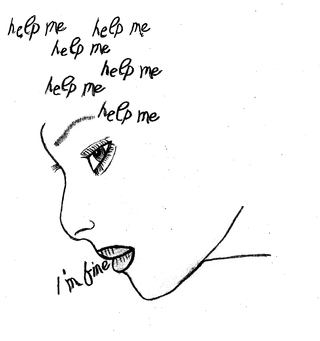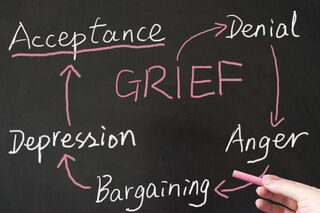Grief
Grief After Stroke
Regaining confidence after losing your career, mobility, and independence.
Posted March 18, 2021 Reviewed by Matt Huston
- Stroke often comes with various losses, and grief is a normal response.
- Grief after stroke may include emotions like shock, anger, sadness, and guilt, and experiences such as denial and loneliness.
- There are many ways of coping with post-stroke grief, including seeking support from loved ones, a support group, or a therapist, keeping a routine, and finding ways to express feelings.
Following a stroke, it’s normal for both survivors and those who love them to experience grief. A stroke may cause many losses, including the loss of career, mobility, independence, and confidence.

Grief is experienced in different ways. Many factors come into play, such as one's personality, coping mechanisms, life experiences, faith, and how significant the loss is. Our grief experience is as individual as our lives. Don’t allow anyone to tell you how you should feel, and don’t judge yourself on how you’re feeling. Grief is not just an emotional process. Physical symptoms such as fatigue, nausea, weight loss or gain, insomnia, and physical pain often accompany grief.
Ignoring the pain of grief won’t make it disappear faster and may ultimately prevent you from beginning to heal. There are no benefits to attempting to appear strong and not allowing others to see your true emotions. Sadness, fear, and loneliness are normal reactions to loss. Crying is not a sign of weakness. Showing your true feelings will allow others to understand your situation and offer support. And if you don’t cry, it doesn’t mean you aren’t experiencing emotional pain; you may have other ways of displaying it.

The experience of grief after a stroke often includes the following components:
- Shock and denial. Numbness, disbelief, and sometimes even total denial can follow a stroke. These feelings offer emotional protection and prevent you from becoming completely overwhelmed. After my stroke, I couldn't believe it had happened to me and I spent time in complete denial about its severity.
- Pain and Guilt. As unbearable as these emotions are, it’s important you experience them and avoid escaping with unhealthy alternatives such as alcohol or other substances. Your life may feel out of control and frightening during this stage. I felt like a burden, as I was unable to take care of my family and required help with many tasks.
- Anger and Bargaining. We discussed anger in a previous blog post. You may ask yourself, “Why me?” and attempt to bargain your way through: “I vow to be a better person if you make this all go away.” I often lashed out at those around me as I was resentful and frustrated with the stroke and everything it took from me.
- Sadness, Loneliness, and Reflection. There is generally a period when you begin to realize the actual magnitude of your losses. You may feel the need to isolate and look back on things you did or did not do before your stroke. Feelings of emptiness and even despair may be a part of this time. Encouragement from others is often not helpful as you need time to work through these emotions. Personally, I can say I felt worthless and forgotten. Nobody cared.
- The Turning Point. As you begin to adjust to life post-stroke, things become calmer and feel less overwhelming. Your emotions begin to stabilize and your attitude starts to get more positive. Being able to eventually accept what had happened allowed me to find peace.
You don’t have to have all of these experiences to heal, and you most likely won’t experience them in this order, so don’t be concerned about what you should be feeling or what stage you should be in.

Strategies for Coping
While grief is an inevitable part of life, fortunately, there are ways of coping and eventually learning to move forward:
- Seek support. Grief may cause you to want to retreat, but support from others is vital to the healing process. It helps to share your feelings to ease the burden. You don’t need to talk about it every time you interact with others, but the key is to avoid isolating. Often others don’t know what they can do to help. Don’t be afraid to ask for what you need. Perhaps it’s a shoulder to cry on, someone to vent to or just hang out with. Understand that many people may feel awkward when trying to comfort you, resulting in them saying or doing “the wrong” things.
- Draw comfort from faith. If you have a religious tradition, activities such as praying, meditating, or attending services can offer solace.
- Join a support group. Reach out to other stroke survivors in person or via online groups; many are or have experienced similar feelings.
- Talk to a therapist/grief counselor. If grief becomes too much to bear, reach out to a professional with experience in grief counseling. They can assist you in working through intense emotions and beginning to overcome obstacles. They can also help you distinguish between grief and depression. They can recognize complicated grief and intervene.
- Look after physical health. The mind and body are connected. When you take care of your physical health, you are better able to cope with the emotional challenges of grief.
- Plan for grief triggers. Your stroke anniversary may be a difficult day each year. Be prepared for an emotional response and understand that this is completely normal.
- Express your feelings. Write about your losses and feelings in a journal. I started sketching following my stroke and it became the way I expressed how I was feeling.
- Try maintaining hobbies and interests. Having a routine can offer comfort. Returning to activities that bring you joy can help you cope with loss. If your stroke prevents you from doing this, begin experimenting with other activities that bring you joy.
The grieving process takes time and happens gradually, with no guaranteed timeline. Whatever your grief journey is, be patient with yourself and allow the process to unfold naturally.


